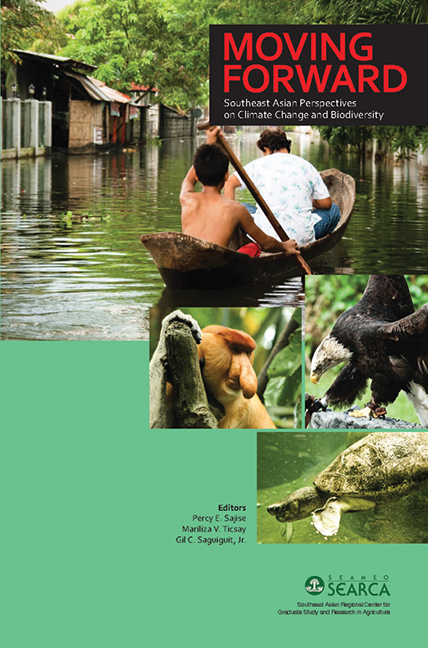Book contents
- Frontmatter
- Contents
- Tables
- Figures
- Foreword
- Preface
- Contributors
- Acronyms
- INTRODUCTION
- REGIONAL PERSPECTIVES AND CROSS-CUTTING ISSUES
- COUNTRY PERSPECTIVES
- 5 Animal Genetic Resource Conservation and Climate Change in Cambodia: Reducing Livestock to Decrease GHG Emission?
- 6 Malaysia's Current Policy and Research Initiatives Toward Climate Change: Impacts to Biodiversity
- 7 Anticipated Impacts of Climate Change on Marine Biodiversity: Using Field Situations that Simulate Climate Change in Singapore
- 8 Climate Change and Biodiversity in the Philippines: Potential Impacts and Adaptation Strategies
- 9 Research Initiatives on Climate Change Impacts and Adaptation in Thailand
- 10 The Role of Biodiversity in Climate Change Mitigation in Vietnam: The Red River Estuary - Ba Lat Case Study
- 11 Implications of the Dutch-Philippines Biodiversity Research on the Impacts, Vulnerability, and Adaptation to Climate Change: The Coastal Ecosystem
- CHALLENGES AND FUTURE ACTIONS
- Index
5 - Animal Genetic Resource Conservation and Climate Change in Cambodia: Reducing Livestock to Decrease GHG Emission?
from COUNTRY PERSPECTIVES
Published online by Cambridge University Press: 21 October 2015
- Frontmatter
- Contents
- Tables
- Figures
- Foreword
- Preface
- Contributors
- Acronyms
- INTRODUCTION
- REGIONAL PERSPECTIVES AND CROSS-CUTTING ISSUES
- COUNTRY PERSPECTIVES
- 5 Animal Genetic Resource Conservation and Climate Change in Cambodia: Reducing Livestock to Decrease GHG Emission?
- 6 Malaysia's Current Policy and Research Initiatives Toward Climate Change: Impacts to Biodiversity
- 7 Anticipated Impacts of Climate Change on Marine Biodiversity: Using Field Situations that Simulate Climate Change in Singapore
- 8 Climate Change and Biodiversity in the Philippines: Potential Impacts and Adaptation Strategies
- 9 Research Initiatives on Climate Change Impacts and Adaptation in Thailand
- 10 The Role of Biodiversity in Climate Change Mitigation in Vietnam: The Red River Estuary - Ba Lat Case Study
- 11 Implications of the Dutch-Philippines Biodiversity Research on the Impacts, Vulnerability, and Adaptation to Climate Change: The Coastal Ecosystem
- CHALLENGES AND FUTURE ACTIONS
- Index
Summary
To meet the demand for staple food in the next 40 years, developing countries focus on the growth of agriculture. However, the United Nations Conference on Environment and Development (UNCED) intensified their campaigns to increase the awareness of policy makers and scientists on the need to consider the impact of agricultural production on the environment. The development of strategies to meet the increased demand for food should, therefore, be based on a sound understanding of the impacts of different types of production systems. The objectives of increasing food production while conserving the functional production system and the environment must be combined.
Conserving and increasing farm animal production may affect the current fragile environment at a considerable level. Technically, microbial degradation of feed in the rumen is characterised by the formation of short- chain fatty acids (SCFA), mainly acetate, propionate and butyrate; gasses, mainly CO2 and CH4; and microbial biomass (MB).
In proportion to the amount of feed degraded, less gas is produced if there is high feed conversion into microbial biomass (i.e., high efficiency of microbial production) than under proportionally high SCFA production (Leng 1993., Van Soest 1994). Methane is produced with acetate and butyrate, but not with propionate. Methane is an important GHG. Its atmospheric abundance is being related to anthropogenic sources including rice paddies, biomass burning, ruminants, land fills, coal mining, natural gas systems, and storage of livestock wastes (Hogan et al. 1991). Any reduction in CH4 emission would be 20–60- fold more effective in reducing global warming than a similar reduction of CO2 emission (Shine et al. 1990). Recent inventories have suggested that livestock manure significantly contributes to global CH4 emissions. An increase in both the farm animal population and the use of liquid-based manure management systems was seen as the cause (Safley and Westerman 1992; Husted 1993).
PROBLEM
Animal genetic resources are important assets in the agricultural production system of rural areas. Appropriate uses of these resources in the production system are critical requirements for sustainability.
- Type
- Chapter
- Information
- Moving ForwardSoutheast Asian Perspectives on Climate Change and Biodiversity, pp. 87 - 100Publisher: ISEAS–Yusof Ishak InstitutePrint publication year: 2010



